Super Rugby Women’s Grand Final teams: all roads lead to Ballymore, Emily Robinson reaches milestone
And then, there were two. The NSW Waratahs and Fijian Drua will meet at Ballymore to decide who lifts the Super Rugby Women's trophy,…
Sixteen years ago Fiji pushed the Springboks in the quarterfinals of the 2007 World Cup. Now, the Flying Fijians are on the doorstep of returning to the final eight for the first time since then.
After snapping their 69-year hoodoo against the Wallabies, and getting past Georgia in Bordeaux on an afternoon full of nerves and anxieties last weekend, victory over Portugal, or even a losing bonus point, will set up a quarterfinal appearance against England and a return to Marseille. It will also see the Wallabies crash out at the pool stage for the first time.
Nor will they fear the Red Roses, having delivered a statement of their own on the eve of the World Cup by defeating Steve Borthwick’s side for the first time in their history at Twickenham.
No wonder the Flying Fijians have won over the Royal Family, with King Charles and Queen Camilla, as well as Prince William, requesting visits in recent weeks.
Fiji’s rise as Wallabies slayers comes less than eight months after head coach Vern Cotter left the side in curious and untold circumstances.
It left Fijian rugby in somewhat of a crisis following an overhaul of the board that came after a change of government.
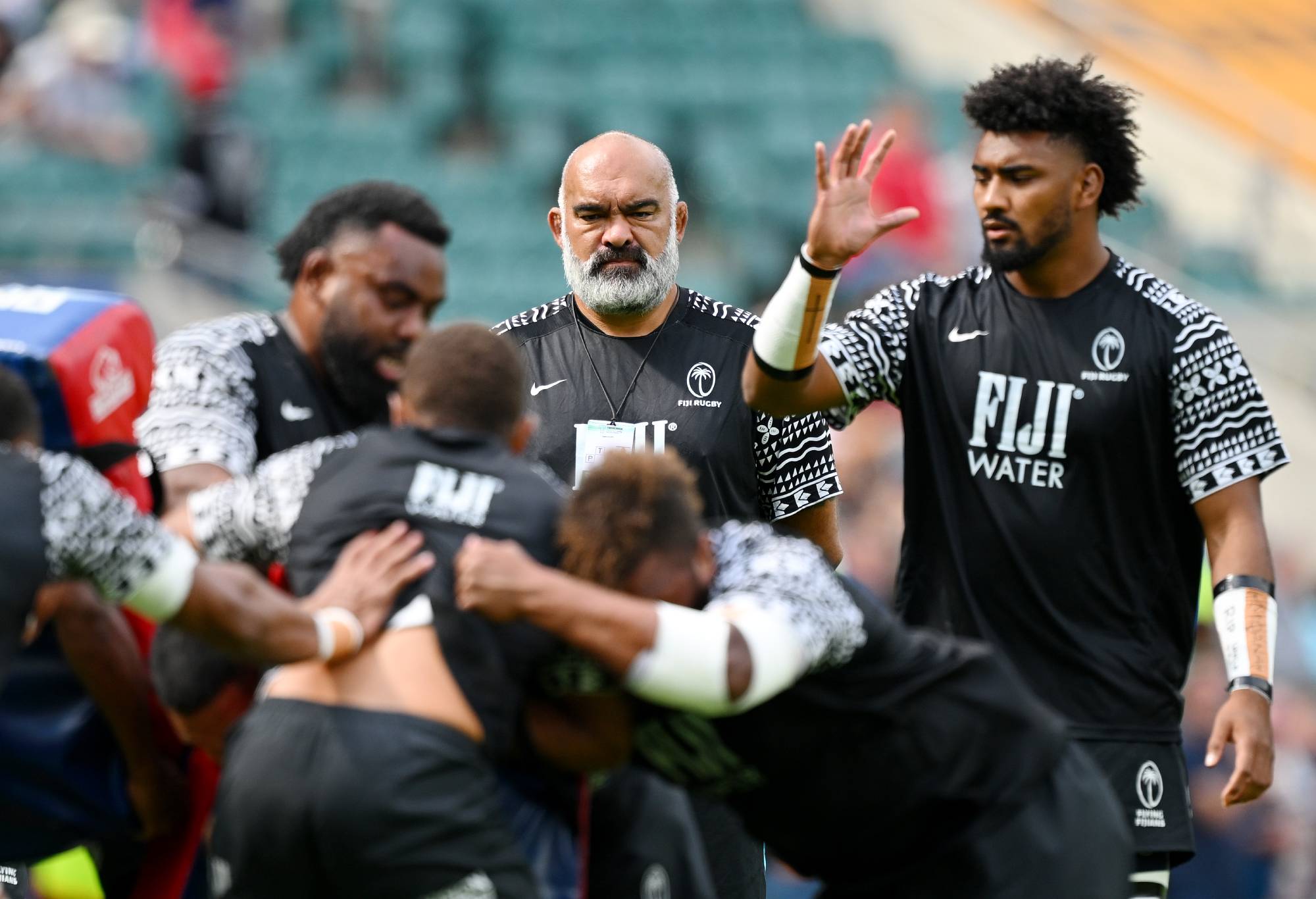
Simon Raiwalui has helped mastermind Fiji’s rise in 2023. (Photo by Clive Mason/Getty Images)
It meant they were the third national union in Pool C following Australia and Wales to have a coaching change inside 10 months of the World Cup starting. Some, of course, have rallied better than others.
But to get an understanding of Fiji’s rise and ability to capture the world’s hearts, the fingerprints are very much from the hands of their former captain turned coach Simon Raiwalui.
After all, how else have the Fijians managed to overcome the instability caused by a late coaching change; the devastation of letting a chance to knock over Wales first-up slip through Semi Radradra’s fingers; the heartbreak of inside centre Josua Tuisova losing his son in the hours leading up to kick-off against Georgia; and, of course, the terrible start against the Eastern Europeans where they overturned a 9-0 half-time deficit before holding on 17-12?
In years gone by, Fiji would have fallen in a bundle and capitulated just as they did four years ago when they lost to Uruguay a week after having the Wallabies on the ropes.
Their resilience against Georgia was one of the first things Raiwalui spoke of following their come-from-behind win.
“Sometimes Fiji’s known for playing flamboyant rugby, so it was good to get an ugly win and come through,” Raiwalui told The Roar.
“It shows the strength and mentality of the group through the leadership group and being able to stick to the task.
“We were just grateful to get a win against a great Georgian side, who put us under a lot of pressure. We were pretty happy in the end.”
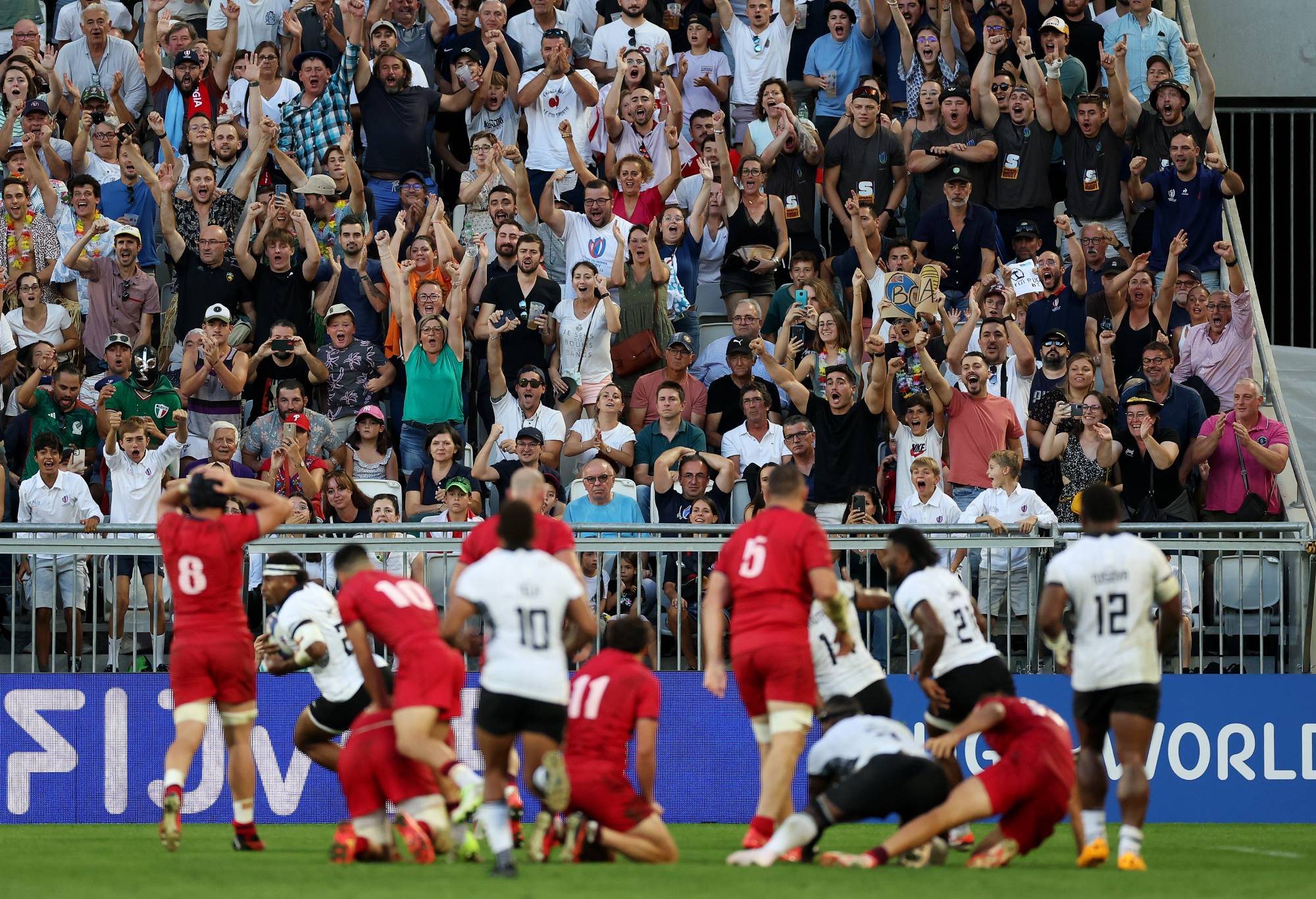
Fans celebrate as Vinaya Habosi scores a vital try for Fiji against Georgia at Nouveau Stade de Bordeaux on September 30, 2023. (Photo by Catherine Ivill/Getty Images)
Now, armed with shields of mental fortitude built by forging a strong culture, Fiji looks set to overcome the odds by qualifying for the finals.
Raiwalui, as much as he doesn’t want to be the face of Fiji’s late run this World Cup campaign, is very much at the heart of their late run.
Right from the outset when Raiwalui took over, he had his supporters.
Not only did the Fijian Rugby Union want a local coaching the side, so did many of the players.
“He’s a Fijian and I firmly believe he is going to be great for our team,” Fijian great Nemani Nadolo told The Roar in March.
“No disrespect, we’ve always had foreign coaches come in and take lead and take charge, but the great thing is to have one of our own come and coach us. It’s changed the dimensions of the squad and it’s great to have him.
“I think he’s going to do well and, obviously, he doesn’t have time on his hands but us Fijians are resilient people and we make do with what we’ve got and try and make something out of it.”
Perhaps importantly, Raiwalui didn’t crave the role. Like many successful leaders, it came to him.
“It came about because of the Vern Cotter situation and leaving the team and I got asked to apply,” Raiwalui said.
“I hadn’t been thinking about it at all because I’d been the general manager of high performance and looking at the logistics and preparing the team and getting all the pathways right; the Drua. So I hadn’t thought about coaching at all until I was approached.”
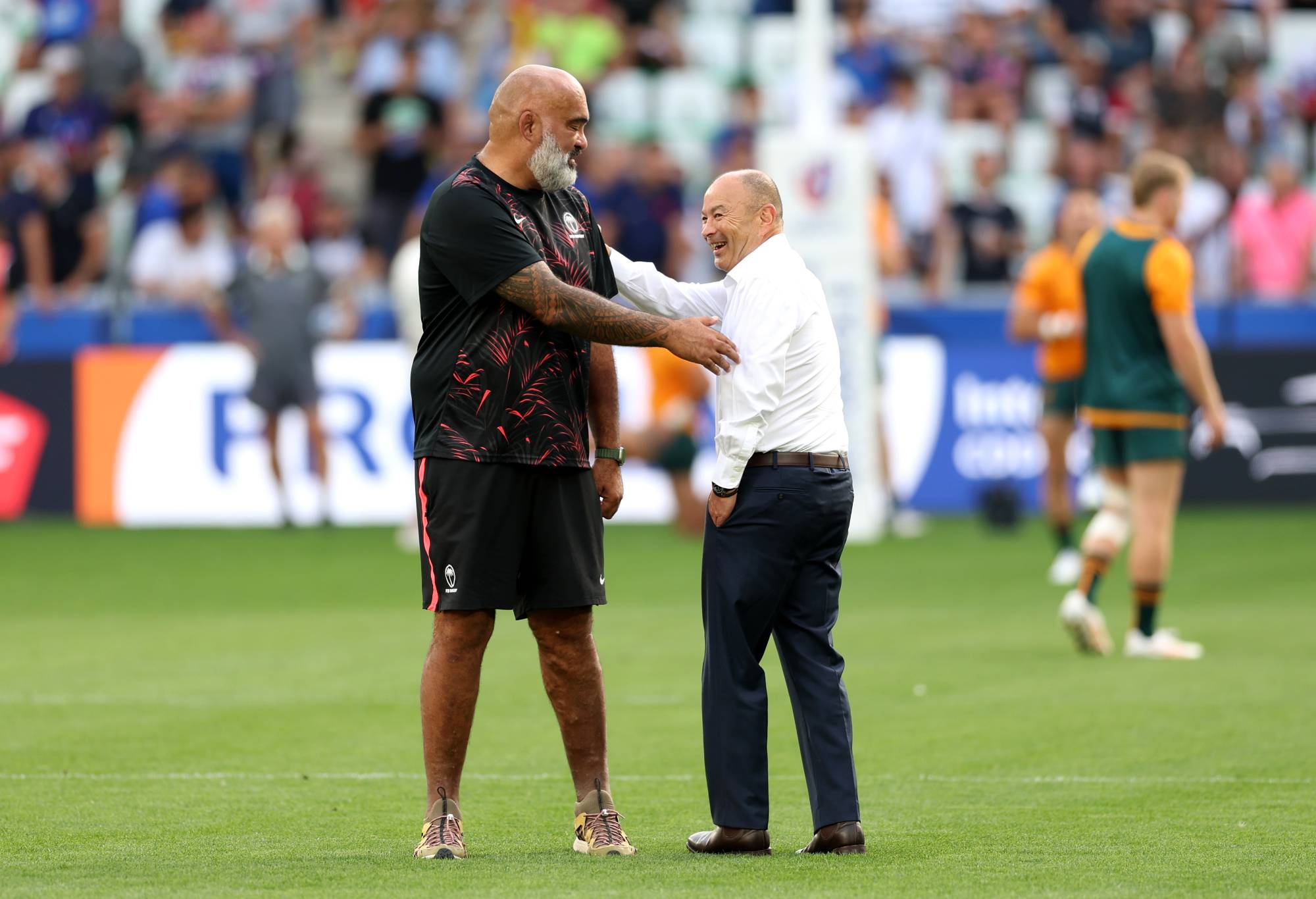
Simon Raiwalui exchanges pleasantries with Wallabies coach Eddie Jones ahead of their win at Stade Geoffroy-Guichard on September 17, 2023 in Saint-Etienne. (Photo by Phil Walter/Getty Images)
While the former Flying Fijian back-rower says he would have liked more time to prepare, he recognised more than anything that for the squad to go deep into the tournament, they needed to get back to what it was to be Fijian.
“I’ve played and captained and been involved as the general manager, so I do think that does help,” said Raiwalui, who played for the Manly Marlins during his younger years.
“When you’ve got good people to work with and you treat them well, it creates a good culture.
“We really targeted that culture, going back to the islands, up to Taveuni for the first week, staying at humble abodes in hallways and on the mattresses. Just the connection from the boys that had come from Europe and Japan, Australia, back to the boys playing with the Drua, that was a real focus for us and getting out to the villages and meeting people and saying thank you to the people that have got us there.
“That really helped us reconnect with where we’re from and who we’re playing for. I can’t commend enough the staff and Wise [Waisea Nayacalevu]; Wise has been awesome as a leader driving the boys and pushing that message. I think that’s been a real positive.”
Tracing Fiji’s rise back further, the humility the side has shown, the physicality they have displayed on the field, their dazzling ability with ball-in-hand, as well as the togetherness and spiritualness of the group, reflects the calm nature of their coach.
Unlike other more abrasive and provocative figures like Eddie Jones and Michael Cheika, who are very much in the Jose Mourinho mould, Raiwauli sits on the other side of the ledger.
Raiwalui puts his coaching philosophy down to the “humble beginnings” of his life, where he and his two siblings were raised by his mother, Joceyln, in Sydney after moving to Australia from New Zealand following his parents’ separation.
“I think I’m pretty even-keeled,” he said.
“I’m all about respecting who we are and who we’re playing. If you don’t treat people well, it normally comes back to you and if you don’t treat the players well and the staff well, they can turn against you.
“I’ve always lived off the philosophy, you treat people how you want to be treated.
“I love the game. It’s provided me everything in my life. I came from pretty humble beginnings in life and rugby gave me the opportunity to travel the world and play and earn a living and take my family to beautiful places, so I want to respect that.
“I can obviously get angry at times, but I like to control my emotions as much as possible.”
He adds: “My mum was a single mum and worked two or three jobs to make ends meet. We were left to look after each other.
“We grew up in Tempe in Sydney, which is obviously quite expensive now, but when I lived there it wasn’t. it was the flight path for all the planes into Sydney. It was it was a great place to grow up and I loved growing up there.
“My mum worked really hard to give us the opportunity to do things and it grew our independence as kids as well. It’s not until you’re older and you look back at all the sacrifices she made for us to be able to eat and live and to be able to do certain things.
“I always wanted to be a rugby player and make sport a part of my career and I was lucky enough to get opportunities to do that, which is why I’m always grateful for the game.”
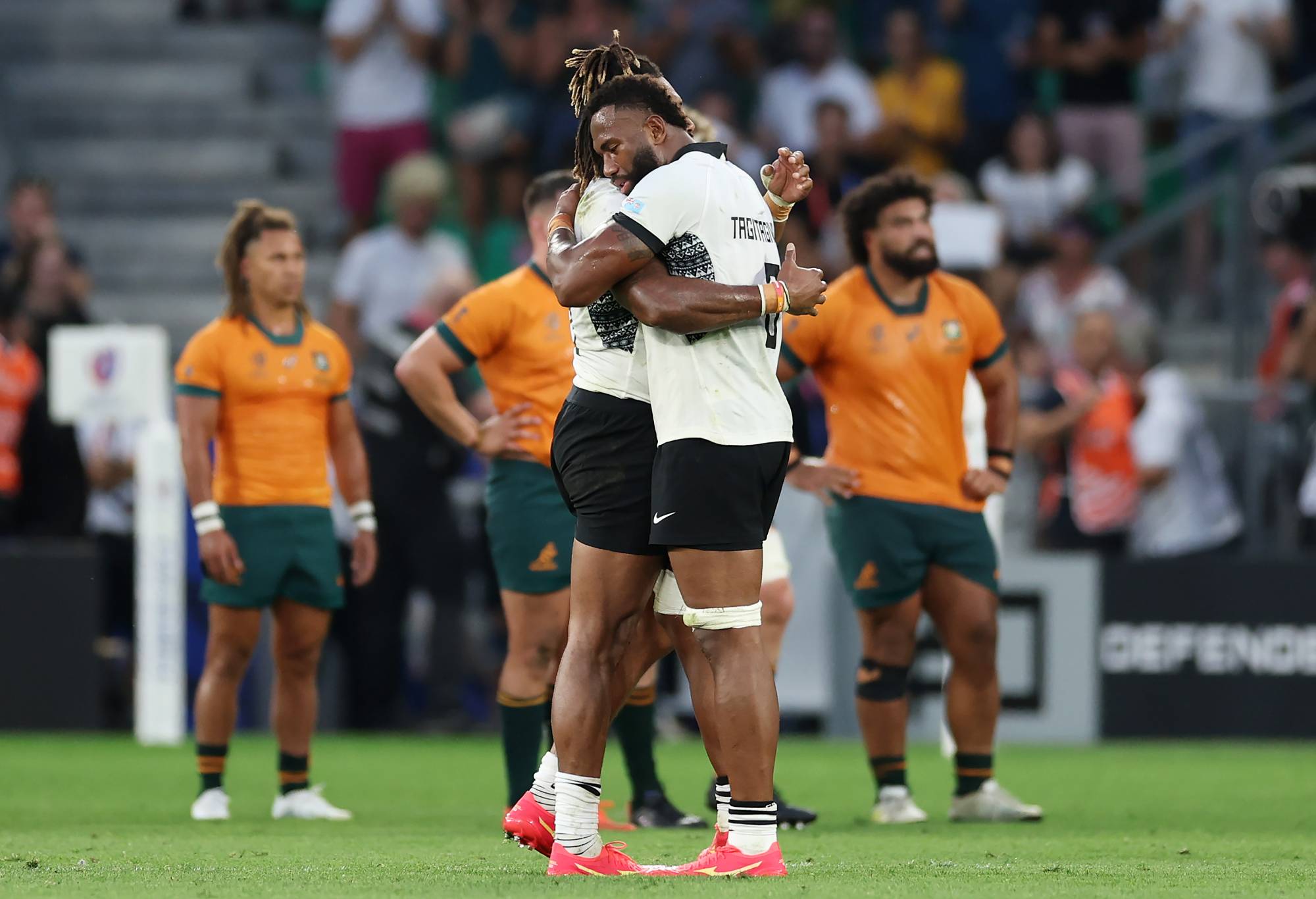
Waisea Nayacalevu embraces Lekima Tagitagivalu following Fiji’s win over the Wallabies at Stade Geoffroy-Guichard on September 17, 2023 in Saint-Etienne. (Photo by Phil Walter/Getty Images)
It’s not just Raiwalui’s rich understanding of the game that has helped Fijian rugby in recent years, but more than likely his ability to relate and inspire, too.
After losing his father as a teenager, a moment Raiwalui says was a “defining moment with my independence”, the 49-year-old lost his mother during the Covid pandemic. Making it harder was not being able to leave Fiji because of the border restrictions.
Those hardships have undoubtedly helped provide some context as to the tightness of the Fijian squad, who recently rallied behind Tuisova following his son’s passing.
Raiwalui, whose pathway into coaching started in Lille before getting his breakthrough with Racing 92, says former Wallabies coach Cheika, who brought the Fijian into his coaching team ahead of the 2019 World Cup, has been pivotal to his coaching career.
“He was a huge influence on me, just in terms of the person that he is,” Raiwalui said.
“He’s one of those guys that when you need someone in life, he’s one of those people that you know you can call and he’ll be there for you. He’s so loyal.
“The perception that comes out across the media is nothing like what he is. He helped me in terms of focusing on what’s important and how to prepare, asking hard questions and making sure you back yourself. I haven’t got enough time for him as a person.”
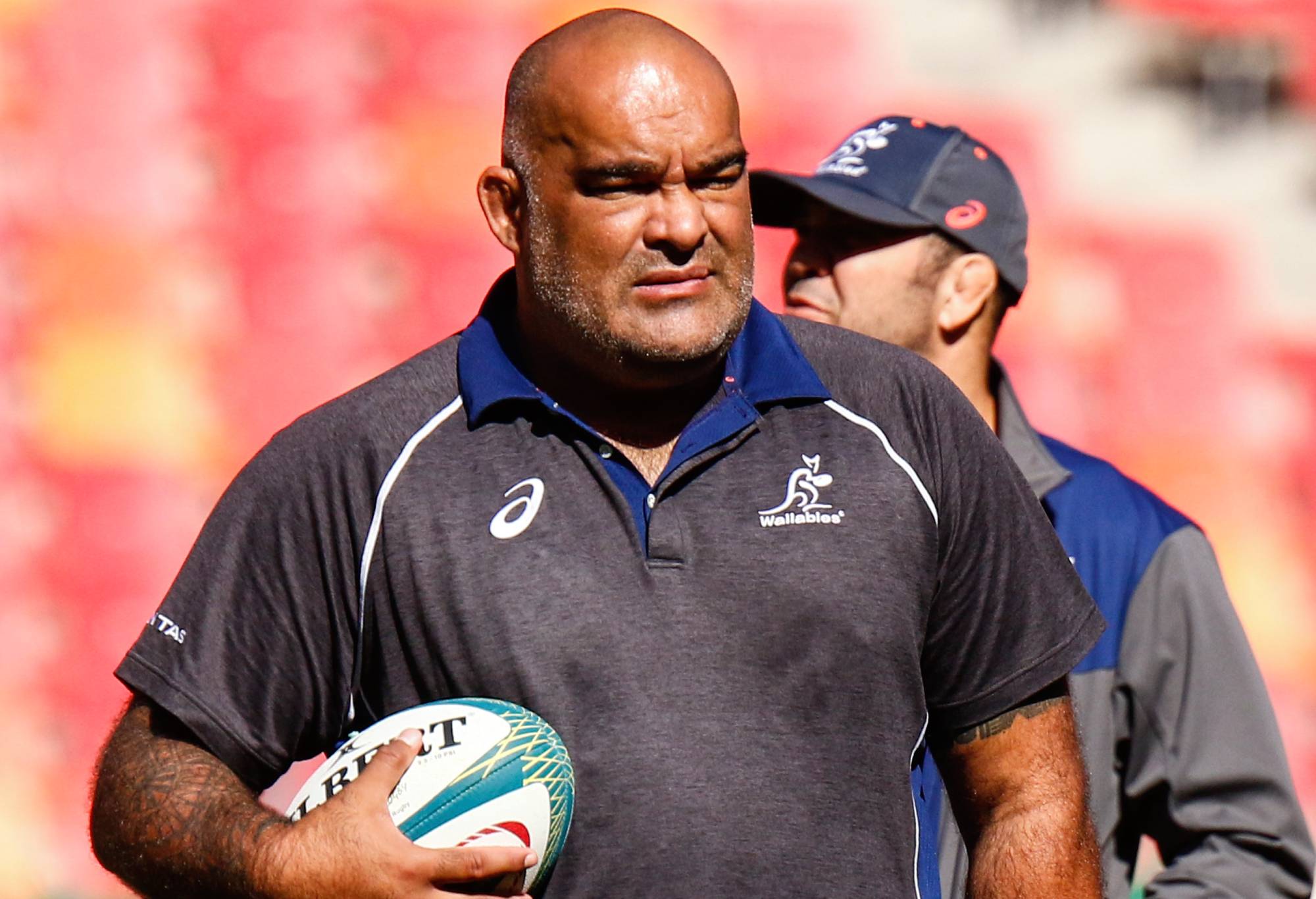
Simon Raiwalui says his former Wallabies colleague Michael Cheika was influential in his coaching journey. (Photo by Michael Sheehan/Gallo Images/Getty Images)
On the cusp of reaching the final eight, Raiwalui isn’t changing anything.
He watched Portugal take it to the Wallabies from his hotel and says it would be “disrespectful” to look past the Europeans this weekend.
More prayers?
“There’s not anything additional just because of who you’re playing or the context of the game, it’s part of who we are and it’s part of our culture,” he said.
“It’s [religion] important for us outside of rugby. The rugby’s there, but the religious part of the team is just a part of the culture and it’s always there.”
So what would success look like at this year’s World Cup in the eyes of Raiwalui?
“When I get the most emotional and when I’m the most proud is when I see the collective so close,” he said.
“There’s been multiple times during the campaign where it might not even be rugby, it can be off the field, it could be something they’re doing as a group, and that’s when I get the most pride.
“When our boys are happy and when they’re smiling, they’re normally successful.
“I’ve been really proud of the group, I’ve been really honoured to be part of this group and to put them in a position where they can perform. They’re the things when I go back, obviously the rugby’s very important, but I do look back with pride when I see the group so tight.”
And what about meeting King Charles?
“I think they were a bit surprised because our boys are not really up to knowledge with the royal protocols, where they were grabbing them and asking them for selfies,” Raiwalui said.
“It was interesting, but I think they loved it just as much as our boys love it because there’s a genuineness to our boys that people gravitate towards it. It’s great to see them in those sorts of situations, just jumping in for selfies and shaking hands.
“They’re obviously not used to that sort of thing, but they were loving it as well. King Charles stopped and listened to us. We sang him a hymn and he loved it. It was very humbling to be able to meet people like that.
“King Charles was quite a formal setting, so they enjoyed that and we showed him a part of our culture. But I think Prince William coming into the dressing room, our boys were jumping in and grabbing him and shaking hands and enjoyed that a lot.”